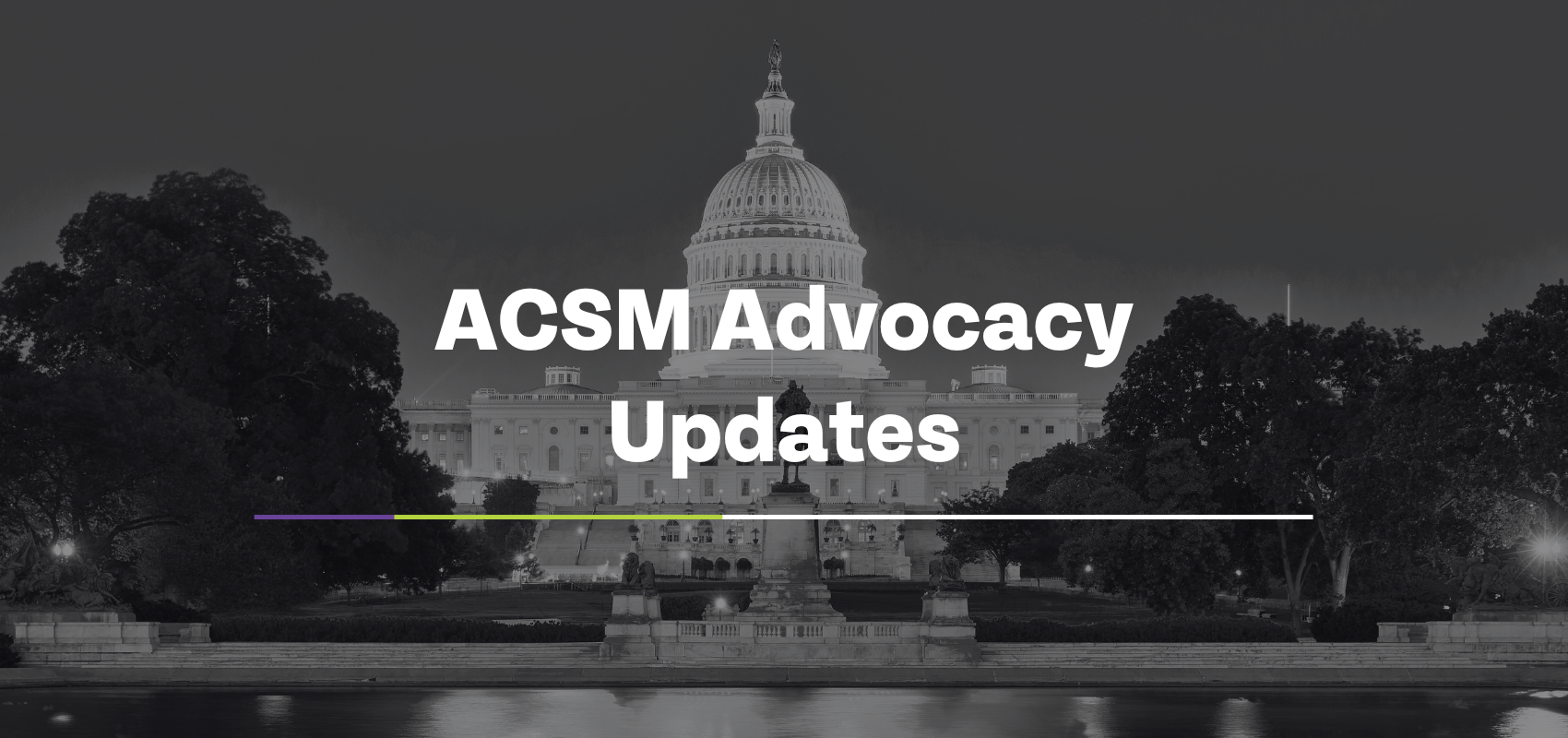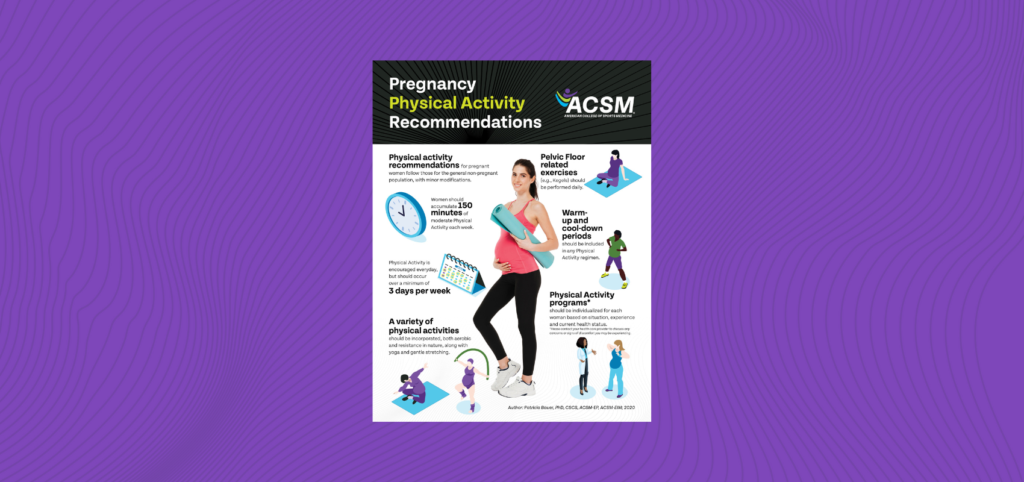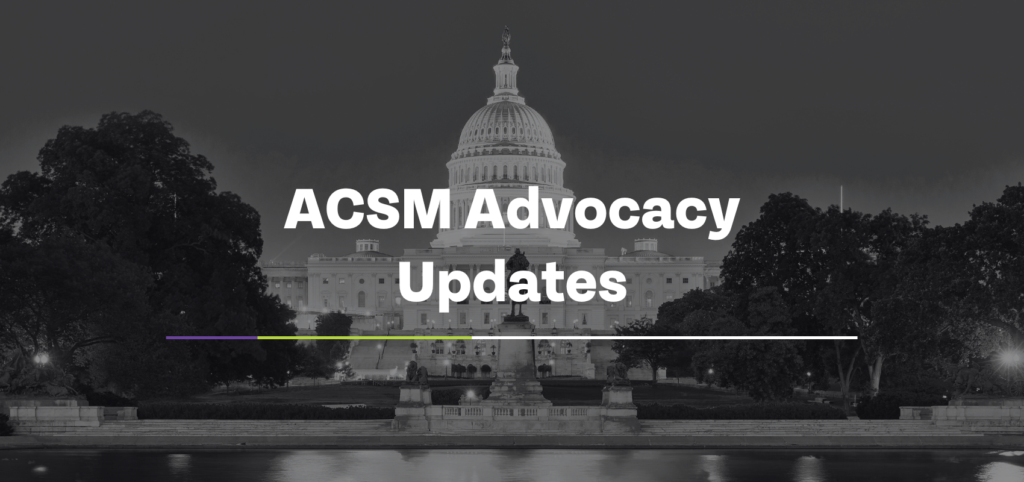ACSM works to keep our members and certified professionals updated on the latest news impacting science, medicine, fitness and health from Washington D.C. Here are the latest updates:
MAHA Report Released
The U.S. Department of Health and Human Services (HHS) released the “Make Our Children Healthy Again Strategy,” a comprehensive policy framework featuring over 120 targeted initiatives to address the underlying causes of childhood chronic disease. Developed in collaboration with the Make America Healthy Again (MAHA) Commission, the report identifies poor nutrition, exposure to environmental chemicals, inadequate physical activity, chronic stress, and medical overuse as primary drivers of the ongoing pediatric health crisis.
The strategy outlines forthcoming executive actions and regulatory reforms aimed at increasing scientific transparency, strengthening food and health systems, and aligning federal efforts to confront chronic disease. Key priorities include expanding research in nutrition, mental health, autism, and vaccine safety, and implementing reforms that tie Medicaid quality measures to improved nutrition and physical activity. The plan also supports provider-led discussions on lifestyle and dietary interventions as core components of preventive care
The strategy report can be found here.
The Make Our Children Healthy Again Strategy places a spotlight on boosting physical activity for American children as a primary strategy to combat chronic disease and promote lifelong wellness.
Physical Activity Initiatives in the MAHA Report
- The MAHA report recommends designating physical activity as a “vital sign” for children, emphasizing its importance alongside metrics like blood pressure and height. The report backs a target of 150 minutes per week of moderate-to-vigorous movement for all children.
- Schools are urged to reinstate the Presidential Fitness Test, originally launched in the 1960s, to regularly assess student speed, strength, and cardiovascular health. This is aimed at reversing “unprecedented levels of inactivity,” largely attributed to increased screen time and shifting educational priorities.
- The commission proposes broad campaigns—integrated with the President’s Council on Fitness and Nutrition—to encourage daily movement at school and after-school programs, making activity as central as academic achievement.
- There is also a strong call for public education initiatives to reduce screen time and promote outdoor play, paired with updated Physical Activity Guidelines for Americans and new incentives for communities to build active living environments.
Policy and Research Recommendations
- The report encourages new cross-agency research on the links between inactivity, diet, mental health, and chronic diseases, with NIH leading coordinated studies using wearable devices and electronic health data to set better activity benchmarks.
- Medicaid and other health programs are recommended to treat fitness as a measurable “outcome,” with the potential for value-based reimbursement based on improvements in students’ physical well-being.
- The MAHA task force will oversee integration of physical activity metrics in federal child health surveillance and policy, aiming for evidence-based approaches that help tie school and community interventions to measurable declines in disease risk.
House Appropriations Committee Approves Funding Bill
The House Appropriations Committee advanced the FY 2026 Labor, Health and Human Services, Education, and Related Agencies Appropriations Act. The bill allocates $108 billion in discretionary funding for the Department of Health and Human Services (HHS), representing a reduction of approximately $7 billion, or six percent, below the enacted FY 2025 level. Funding for the National Institutes of Health (NIH) is reduced by nearly $500 million compared to the previous year, while funding for the Centers for Disease Control and Prevention (CDC) is reduced by over $1.7 billion.
Republican members highlighted support for the legislation, citing continued investments in biomedical research, rural hospitals, public health programs, and efforts to strengthen fiscal accountability. The bill also places restrictions on diversity, equity, and inclusion initiatives, abortion-related services, and gender-affirming care. In contrast, Democratic members expressed strong concern over reductions in funding for the CDC, NIH, and HIV prevention programs, warning of potential impacts on public health infrastructure and medical research.
The measure was approved by a vote of 35 to 28 after adoption of eight amendments. Notably, amendments were adopted to prohibit the Centers for Medicare & Medicaid Services (CMS) from implementing the Wasteful and Inappropriate Service Reduction (WISeR) Model prior authorization pilot and to modify the Public Health Service Act to support ongoing medical education programs.
The bill text can be found here. The bill report can be found here. A complete list of amendments can be found here.
Senate Finance Committee Hearing with Secretary Kennedy
On September 4, 2025, the Senate Finance Committee conducted a hearing on “The President’s 2026 Health Care Agenda,” featuring testimony from Health and Human Services Secretary Robert F. Kennedy Jr. The session explored the Administration’s strategies for advancing health system reform, focusing on chronic disease prevention, rural health infrastructure investment, and patient-centered care initiatives. Committee members scrutinized Secretary Kennedy’s vaccine policy, particularly following the recent removal of CDC Director Dr. Susan Monarez and significant changes to vaccination access. Additional deliberations focused on provisions within the One Big Beautiful Bill Act (H.R. 1), including the Rural Health Transformation Program, exemptions for certain oncology drugs from Medicare price negotiations, and measures to improve program integrity in Medicaid.
During the hearing, Secretary Kennedy underscored the Administration’s commitment to restoring confidence in federal health agencies, citing leadership changes at CDC and revisions to the Advisory Committee on Immunization Practices (ACIP) as necessary steps. Lawmakers expressed bipartisan concerns regarding the politicization of vaccine policies and the broader ramifications for public trust, childhood immunization rates, and equitable vaccine access. The session highlighted ongoing debate over Medicaid funding reforms and the anticipated impact of legislative proposals on rural and vulnerable populations, reflecting a contentious and closely monitored policy environment.
A recording of the hearing can be found here.



